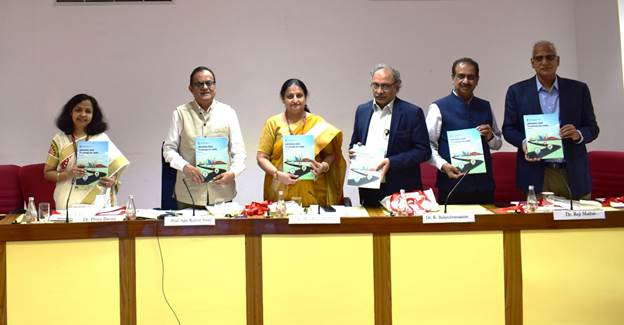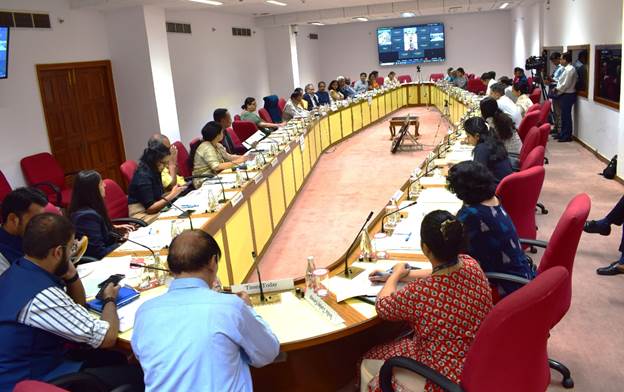Principal Scientific Adviser to GoI launches report on e-mobility R&D roadmap for India to achieve net-zero targets
The “e-mobility R&D Roadmap for India” report was launched by Professor Ajay Kumar Sood, Principal Scientific Adviser to the Government of India today (July 16, 2024) at Vigyan Bhawan Annexe in New Delhi. The R&D roadmap has been prepared after detailed horizon scanning of the global automotive sector and identifying future cutting-edge technological requirements. It categorizes research projects into four important areas: Energy Storage Cells, EV Aggregates, Materials and Recycling, Charging and Refueling, and provides clear pathways to attain global leadership by being Atmanirbhar in the next five years.

(Launch of e-mobility R&D Roadmap for India)
The official launch event, held in hybrid mode, was attended by government officials, members of the Consultative Group on e-Mobility (CGeM), representatives from industry and think tanks, and members of the press and media.
Dr. Parvinder Maini, Scientific Secretary, Office of the Principal Scientific Adviser to the Government of India, Dr. Reji Mathai, Director General, Automotive Research Association of India (ARAI), Pune, Dr. K. Balasubramanian, Director, Non-Ferrous Materials Technology Development Centre (NFTDC), Hyderabad among others participated in the event.

(E-Mobility R&D Roadmap for India Report Launch underway)
In his opening address, Prof. Sood highlighted that India aims to achieve a 45% reduction in emission intensity by 2030 and energy independence by 2047 to reach net-zero commitment by 2070. A significant part of this vision will require the wider adoption of electric vehicles, manufacturing of indigenous energy storage systems, and generation of renewable energy to feed charging infrastructures. He said that presently the e-mobility value chain heavily depends on imports. Prof. Sood emphasized on reducing our dependence on imports within the e-mobility value chain and the requirement of strengthening domestic R&D capabilities in the automotive sector.
Dr. Preeti Banzal, Adviser, Office of PSA presented a brief overview of the Office’s significant efforts toward creating a strong R&D ecosystem in the automotive sector. She informed that the Office of PSA, in August 2022, had constituted a ‘Consultative Group on eMobility (CGeM)’, which is a panel of experts from government, academia, and industries to devise technical roadmaps, studies, documents for accelerating migration of prevalent fossil fuel-based transportation sector towards electric mobility in India. The roadmap document has been prepared by ARAI under the overall guidance of CGeM.
Prof. Karthick Athmanathan, PSA Fellow and Professor of Practice, IIT Madras, presented a summary of the e-mobility R&D roadmap for India. He explained how the DST White Paper has successfully addressed the actions needed to get out of the current import-dependent situation and how this roadmap helps avoid a similar situation arising in the future as technologies are developed over time. Prof. Athmanathan indicated that the research projects have been identified by the experts on both Technology deployment and Market leadership as the primary objective. Priority for research projects was assigned based on their potential impact on achieving national energy independence, the feasibility of implementation within the set timelines, market dominance, and their ability to leverage existing infrastructure and resources.
After the presentations, the Chair opened the sessions for questions and answers from members of the press and media. It emerged that the e-mobility R&D roadmap charts a course towards future independence and self-sufficiency, outlining critical research initiatives that will position India as a leader in the global value and supply chains within the next five to seven years. This roadmap aims to fill critical gaps in the current research and development framework. While many identified projects are yet to achieve global success, some areas already demonstrate significant international accomplishments where India is yet to commence preparations. These projects are included to establish a strong foundation for the country to pursue future innovations in those areas when opportunities arise.
In his concluding remarks, Prof. Sood said that the automobile sector in India is one of the largest contributors to the country’s GDP and, considering its fast growth trajectory, it will continue to do so in the future. He emphasized that this progress should be aligned with the Net-Zero vision of the country and there is an impending need to foster a culture of R&D and innovation-driven growth in the automotive sector.

(Group Picture of E-Mobility R&D Roadmap for India Report Launch)
The full e-mobility R&D roadmap report can be accessed here:

